Beyond charity: a glimpse of a socialist future
We need to move past institutions, towards an ethic of abundance, love and care.
Hello, and welcome to this week’s Barely Civil Society, where we’re trying to pull our heads out of funding and misery and think about what the point of this all is.
The funny personal bit
I’m trying very hard to be funny this week, but I have a bad cold, which is, irritatingly, not COVID. This means I lose, because my partner had COVID a couple of weeks ago, still has the cough, and I was hoping to get him back for the sleep deprivation. I’ll find a way.
Meanwhile, we’re approaching World War III, which is nice, and honestly I can’t think of what to say about that except that yesterday an instagram post was telling me to hoard iodine tablets and water. If I wanted a return to the eighties, I would have gone for Findus Crispy Pancakes and Tom Baker Doctor Who. Instead we get the threat of nuclear armageddon, and I have literally seen white dog shit again recently. What’s that about?
Is ‘charity’ a dirty word?
Is charity now a dirty word? This small charity week, we ask why everybody is so desperate to stop saying it.
People increasingly don’t like the calling things ‘charities’ – even for people who spend their days running and supporting them. What would be better? ‘For impact organisations’? ‘Philanthropy’? ‘Social enterprise’ or ‘social business’? Anything but ‘charities.’
And this leads in to other questions about what we mean by this term. I asked people recently whether they really wanted our charities to cease to exist - a fashionable statement these days. And aren’t there too many of those awful grubby little things always pestering funders and the state for handouts?
As several people said, it comes down to definitions. But the point for me is not to find the ‘correct’ definition. Yes, it partly depends on whether we’re talking about an abstract or concrete noun. Or about institutions, or practices. We’ll get to that. But over the course of this piece, I want to contest and explore some of those definitions and concepts, and the names some would prefer to replace the that bad word with. Because it very much depends on our own principles, ideology, and place in the power structure.
If you’re looking here for a policy debate on legal structure, you will be disappointed. Of course, charity is also a legal structure, and yes, it’s a messy one – from CICs to giant government contractors, it covers a huge range of organisations. But I’m not here to talk legal form. I’m talking about charity as an ethic – and that’s something far more important.
Over the next three issues, I want to do something ambitious: I want to suggest a recentring vision of what charity is at its core – and to suggest why the concept could be more powerful than ever, and more necessary.
Left and right: everybody hates ‘charity’
So, nobody wants to be called a charity. It’s seen as degraded and degrading. As powerfully stinky and unsexy. As déclassé, démodé, and eminently defundable. And let’s be clear - there has been a long campaign from both ends of the political spectrum to runs down the word and associated practices. The left don’t like it because they see it as the antithesis of people sharing in a society on equal terms - and they (rightly I think) distrust its focus on voluntarism as the opposite of socialism.1 And the right don’t like it because they associate it with ‘handouts’- that can look worryingly like a precursor to tax.
Certainly, Marxists of various stripes are right that ‘charity’ as a practice is no substitute for socialism. But I also don’t think it’s helpful for us to believe that we are simply doing the capitalist devil’s work by doing what we do - at least, in terms of the everyday work that charity workers do.
Replace charity with ‘philanthropy’?
Philanthropists much prefer the term ‘philanthropy’. Some ‘philanthropy’ advocates tell us ‘charity’ is a bad word because ‘charity’ implies reliance and lack of dignity. This take is especially popular in centre-right and neo-liberal discourse, but it does appear in left wing discourse too. But if it does mean that, it’s because the economic right have created that myth themselves. That argument has then been incredibly influential, and the ideological switcheroo of it is remarkable: - ‘I don’t want to share because it degrades you.’ Hmmmm. The thing is, one suspects that those on the right only like the idea of self-reliance because they so dislike social responsibility. They just don’t want to be relied on - for taxes for example. Their desire to develop self-reliance in others is not out of some remarkable altruism of a higher or more effective version - it’s often just old-fashioned selfishness.
So many of this view dream of a world of individuals who have no responsibilites to each other and never need each other. And most importantly of all, never need them. The myth of the rugged individual for whom there is eventually no such thing as society is the goal that lurks underneath this. For many in the ‘philanthropy’ space who advocate ‘teaching a man to fish,’ the expressed goal is often to end the need for ‘charity’ - but they fantasise about a world where nobody needs anybody. And if anybody still does, post-’intervention’ - they only have themselves to blame.
Philanthropy, then, dislikes giving ‘handouts’, and purports to retain people’s dignity by giving in a smarter way – usually by some kind of economic stimulus/ teach-man-fish-ism. ‘Philanthropy’ as a word is dignified and future-focused, while ‘charity’ is undignified, temporary, and ill-considered.
But look: the idea that ‘charity’ as it is practiced in most small charities simply gives silvery nothings to the poor does not describe what happens. Apart from food banks and those who give individual grants, very few people do this in ‘charity’ as it is practiced now. Again, this is a common objection from Marxists - but charity as soup kitchens or food banks describes a vanishingly small part of the work civil society and charities do in the modern world. Often, I think criticisms of charities as alsmgiving are railing against, at least until 15 years ago, a barely existing model. It’s also one which those on the frontlines who do continue it would be only too delighted to end. They don’t only because the alternative is letting people starve.
Underpinning this – whether people realise it as they repeat it or not - was another Andrew Carnegie-era myth designed to centre ‘philanthropy’ as something above and beyond the concerns and ken of mere mortals, where a better class of men decides how to ‘fix’ the poor once and for all. That ‘philanthropy’ is better than charity because it is properly thought out - with no handouts. You can’t trust poor people with money – if you could, they wouldn’t be poor.
We need to think about whose interests these renamings serve. Reconceptualising ‘charity’ as ‘philanthropy’ often just serves to reinforce the power of wealth and the ruling class. You’ll notice that nobody who runs an actual charity calls what they do ‘philanthropy.’ Even in the day-to-day world of ‘the sector’, it’s used as an industrial trademark for giving, not receiving – which means it is always used to describe actions that can only be undertaken by those who have, or manage, wealth, privilege and power. Even if people working in philanthropy don’t share these values, they still end up enforcing them. Like managers in a factory – you might not own the factory, but you’re still keeping the system running.
‘For impact’ organisations? Non-profit? Mission-led?
Another recent development is the desire to change the naming of charities to ‘for impact organisations’. This term also speaks about a vision of what the work is, and who should control it. It sounds technological and technocratic. It makes things sound like a science. It makes it sound like something best managed and designed and delivered by think tanks and corporate consultants.
It also puts all the emphasis on matters of measurement - for ‘impact’ and outcome which can be measured by people who’ve got a measurement framework (and no doubt a bridge) to sell you. Of course in the US, organisations have been designated as ‘non-profits’ - that does have the issue that it doesn’t describe what they ARE for. But swapping that with ‘for impact’ is no less opaque. What impact? Facebook has impact. Twitter has impact. Mussolini had impact. Most companies these days say they want to change the world. That’s a reason ‘mission-led organisations’ doesn’t work either. Every business has a mission, or at least it says it does. With all of these things, what we are really avoiding is talking about what we actually do. And I do find it interesting more broadly in ‘third sector’ discourse we spend almost no time talking about the actual work we do. Just endless talk about funding and measuring it and managing it.
So in this case, the power grab is by the ‘intellectual’ elite and the policy wonks. Their interests are largely in the technologies of state, and the power that comes from aligning themselves (and their work, and business of course) with Government, or larger, more programmatic and mass-scale approaches to ‘philanthropy.’ ‘For Impact’ claims ‘charity’ for technocracy – a different elite. This aligns well with the discourses of government and academia who see charities as delivery agents to plug gaps in the system they have designed to fail – and fund them to manage and analyse that. It also constantly leads to the denigration of work that improves day to day lives, especially of working class people: for example, bingo, knitting, youth clubs (unless it’s ‘preventing crime’ or ‘increasing employment), or kids doing drama together. ‘For impact’ redraws the lines of charity and what we can support, to focus solely on fixing the same issues that the state should fix. That in itself then transfers responsibility.
What about enterprise?
What about social enterprises? Or ‘social businesses’? [Oh, hey maybe we should all become B-corps! You know what the B stands for, right?] These are just rebrandings. Social enterprise in particular was an earlier way to try and shake off the notion that charity was sleepy, lazy, lacking dynamism, and unhelpfully inimical to the herculean efforts of the ‘entrepreneur’ – a near magical figure by the mid 2000s who could save the world better than any do-gooder. This was particularly powerful ideologically, because, much like the Carnegie-era philanthropy, it put the power to make decisions and solve problems in society in the hands of capitalism.
This era was particularly dominated in theory by the growth of Silicon Valley, and a rapidly changing economy where ‘start-ups’ and angel investors were changing everything and making significant changes to technology and society - many of them not great, but certainly profitable, as well as deeply destablising.
Often this was social enterprise as just ‘enterprise’ with a social branding – such as when NHS contracts were hived off at the start of the ConDem Government to ‘social enterprise’ CICs, or DWP contracts given to ‘social businesses’ like A4E (a for-profit company from the outset until its rapid demise because, oopsy, no profit). Others were clearly charities who wanted to rebrand and seem ‘up for it’ as my friend called it, rolling her eyes. They wanted to seem like they had the dynamism and supposedly magical touch of the new entrepreneurial class.
I will never forget my two weeks in the Westminster ‘Impact Hub’ where I briefly based the social enterprise I set up for a homelessness charity. Red trousers everywhere. Bluetooth headsets. People called Jonty, Ivo and Ophelia. They wanted to brand themselves with the virtue of social change and the dynamism of the entrepreneurial elite. Others were just charities desperately trying to get with the spirit of the times – a lot of young Black folks who wanted to make a change in their community, but didn’t want to be tarnished with the retrograde (and financially damaging) label of charity.
In the end, some of it was about legal form, business model, or even impact. But much of it was about signalling – and realigning charity with the mood music of silicon valley-era late capitalism
Should charities want to stop existing?
There’s a growing tendency for people in charities to rather angelically claim they want a world where their charity no longer needs to exist. I get that for some charities – but I worry about this being broadened out to all. It seems to me that this only works if you reduce charity to a very specific, patronising definition related to almsgiving. Or indeed, to ‘fixing’ problems.
One particular way of looking at this is to see charities as sticking plasters after state failure.But if we removed all state failure, would we really no longer want charity? Do we imagine a world without ‘need’? That starts to sound a lot again like part of the ‘philanthropy’ dream – that a clever enough programme will eradicate all human dependency.
Wants or needs?
Some people reframe it as saying charities should only meet ‘wants’, not ‘needs’. But that assumes a very binary view – that need is only food, shelter and clothing. What about culture? Relationships? Ways to learn how to love each other? Those are needs too – or at least, they matter. Human connection isn’t a luxury.
There’s a deeper ideological drive here. ‘Philanthropy’ and government both often insist that interventions follow a neat logic chain: input, resources, output. You fix something, then move on. I’ve seen this in regeneration work – stick in some money, fund a coordinator for two years, then it’s ‘done’. Resources are pulled, because supposedly there’s nothing more to do. Fixed! Except of course, it doesn’t work like that. Regeneration has to be constant. The same goes for people: six weeks of talking therapy and your depression is ‘cured’ according to the Warwick Edinburgh scale. Magic.
If you just see charity as a response to state failure, then the logic becomes: fix the state, and you won’t need charity. But that assumes all social problems are systems problems, and all systems problems can be ‘solved’. Once you believe that, you’re soon thinking of humanity as something to be fixed – efficiently, permanently – through the right programme or intervention. All you need is an ‘exit strategy'.
The thing is, continuity or ongoing nurture is unfashionable because it looks like dependence. That means cost. But charity, done well, encourages us to depend on each other. Yes, I want people to have more self-determination – but that’s not the same as ‘independence’. We live in a society. Charity, for me, is not a sticking plaster. It’s glue. It’s what holds us together.
Beyond ‘charities,’ toward ‘charity’
I’ve given you my sense of the history, power, and ideology that sits behind the discourse about namings. But I want us to raise our eyes even further above the technocratic, industrial and legal for a moment. When we’re arguing about whether ‘charity’ should exist or not – and whether we like the word – we are really arguing about what picture of the world we want, and the role human beings should take in it.
I think one of the key problems we find is that we think far too much about ‘charity’ as an industry, and a collection of institutions, and not an ethic. An ethic is a moral practice – a way of living and being in the world. If we see charity as an ethic, it comes to take in much beyond a specific industry. It goes far beyond being a legal vehicle or a collection of organisations. It becomes a way of life and a way of human beings relating to each other. My thinking here is influenced by French philosopher, historian and social critic, Michel Foucault.
The problem is that, instead, we are constantly being told to see charity as some kind of fixed institution – an organisation, a legal model, a particular act of ‘almsgiving’, or a historically specific model of social activity. What I want to move towards instead is seeing charity as an ethic – it was meant to be ‘caritas’ after all. My feeling is that the ‘ethic’ of charity in its various forms has a running thread throughout it – and one which people have often tried to capture for their own interests, sometimes intentionally, and sometimes simply because of the shape of thinking in the times. This has been pushed by those who want to fix, those who want ‘impact,’ those who want to control labour relations, or those who want to deny a socialised state. I worry how easily we have come to believe those spurious definitions and discourses in the ‘sector’ we have to inhabit.
Instead, I want to return us the idea that the ethic of charity - even as it stands, as an industry, as a practice, when done ‘right’ - is one of mutual aid, universal love, and a caring society. As well, as importantly, a world not driven by profit. A world where family is something we create, not just something we are born in. A move beyond scarcity to abundance, and from greed and inequality to fairness and equity. The institutions we put in place should be designed to achieve it. But they are not ‘charity’ itself.
Likewise, if we move away from a focus on charity as ‘almsgiving’ or even the ‘gift’, to charity as care - caritas - and love for others, there is no reason it can’t be continuous with a more fundamental change to a democratic socialism with all of the state support that should entail. Much as there were early concerns among UK charities about whether they should continue to exist after the rise of the welfare state, very soon they realised that not having to feed people or tend the wounded meant they had time to help people connect, thrive and flourish as humans. That, indeed, was something the state itself could not do very well at all.2
It seems to me that state welfare support has to sit alongside civil society and community/ ‘charity’ work as we recognise them now, in order for a truly democratic, communitarian, and fulfilling socialism to exist. As Emma Goldman probably didn’t actually say, ‘If I can’t dance, it’s not my revolution.’ And I will see socialism as failing to reach its full promise if there aren’t community centres and lots of bunting.
The ethic of charity that I sketch here is no doubt something that requires socialism to be able to truly come to fruition. And I hope that wherever this kind of ethic appears in our deeply imperfect but vital everyday practices, this could be seen as sort of ghost from the future - of the kind of society we want to see.
In particular, I want to suggest that, rather than a dangerous diversion from economic social justice, we see it as a potential prefiguration of a kind of democratic, decentred, socialism that puts flourishing and abundance at its heart.
The charity ‘sector’ is indeed a poor substitute for socialism - but in many ways, I think we are its outriders.
Next week
In Foucault’s life, developing and discovering an ethic was done through community: his burgeoning connections to the San Francisco gay scene, and the gay liberation movement. He saw queer people in the seventies starting to build their own notion of how to live and love together, and what mattered to them. When AIDS decimated the gay community, and sadly took Foucault, those practices of freedom (as Simon Watney called them in his collected works) were key to our survival. Universal love and care developed into real organisations and practices and institutions that could make the ethic a reality.
So next week, in part two for London’s Pride, I’m going to talk about some ways of seeing that ethic in action. I’m going to look at ‘queering’ charity as a way of thinking about what the future could look like. This means focusing on some queer cultural ideas and history, which, for me at least, offer a look into a future of what an ethic of charity could be.
Bonus bits
Barely Civil Society is trying to create deeper debate in the UK charity sector.
This blog nearly kills me every two weeks. Even if it is amazing what hyperfocus, insomnia and some research skills can produce. So can you help?
1. Donate towards this work
If you donate, you can help me spend more time researching and writing - including some bigger projects I’m working towards. And I’m really nice. Could you buy me a coffee?

3. Please like and share!
Please share this post on substack or social media - I can’t pay to play, so it’s the only way to grow the readership!
They;re not wrong in many respects, especiallty where it relates to food poverty. See, for example Livingstone, Nicola and Natarajan, Lucy (2025) Charity and capitalism. In: Mendly-Zambo, Zsofia and Raphael, Dennis (eds.) The Politics of Food Insecurity in Canada and the United Kingdom. Policy Press, an imprint of Bristol University Press, pp. 116-150.
See p83, in Johnson, Christian (2001) ‘Strength in community: historical developments of settlements.’ in Settlements, Social Change and Community Action. Good Neighbours. Ruth Gilchrist and Tony Jeffs ed. Jessica Kingsley publishers. London and Philadelphia,





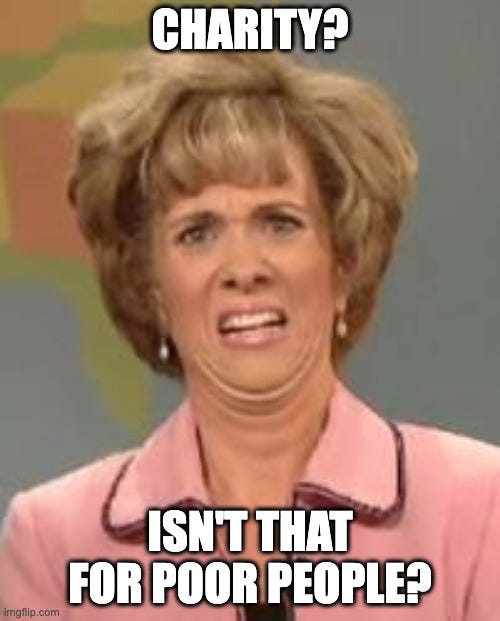
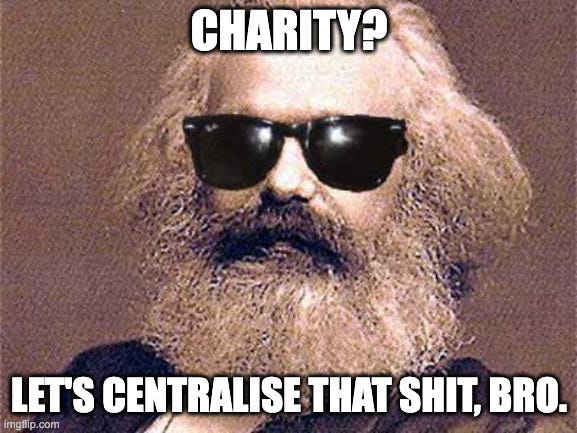


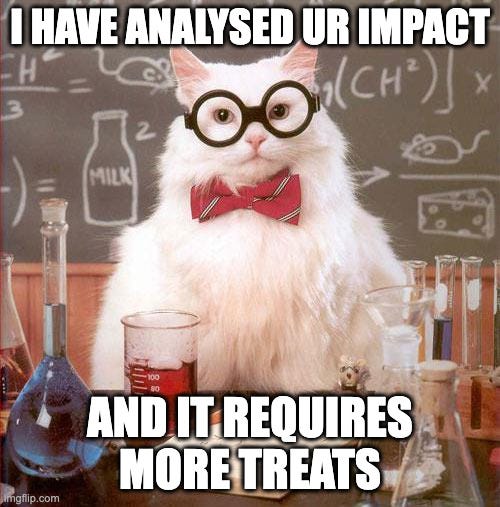

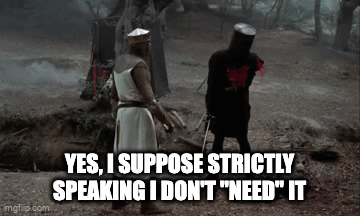
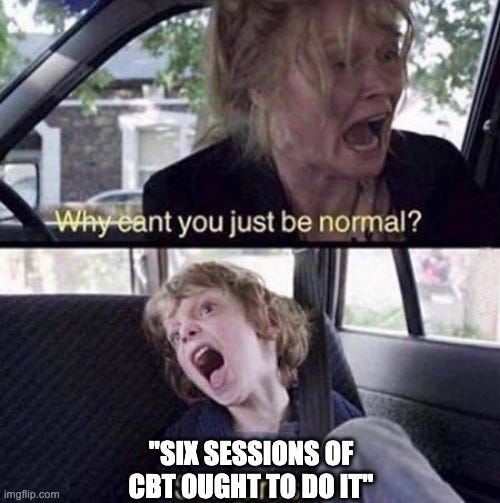

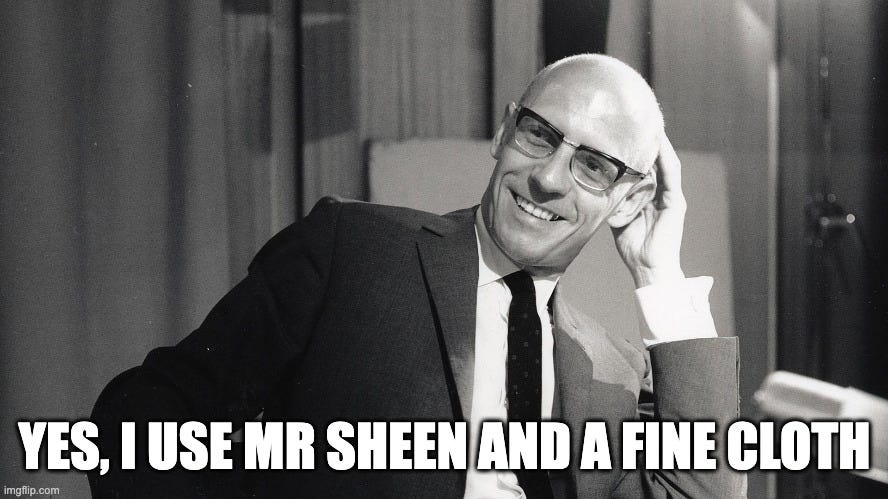




Great reflections (as always). I too think there is a place for 'charity' as an ethos. I think the state shd be meeting 'need' but that 'charity' is better for cultural activity, people looking after their local spaces & places and creating a sense of community - local events & activities. The things which need to be different in different places & benefit from creativity & a local flavour rather than a 'solution' that works for 'everyone'.